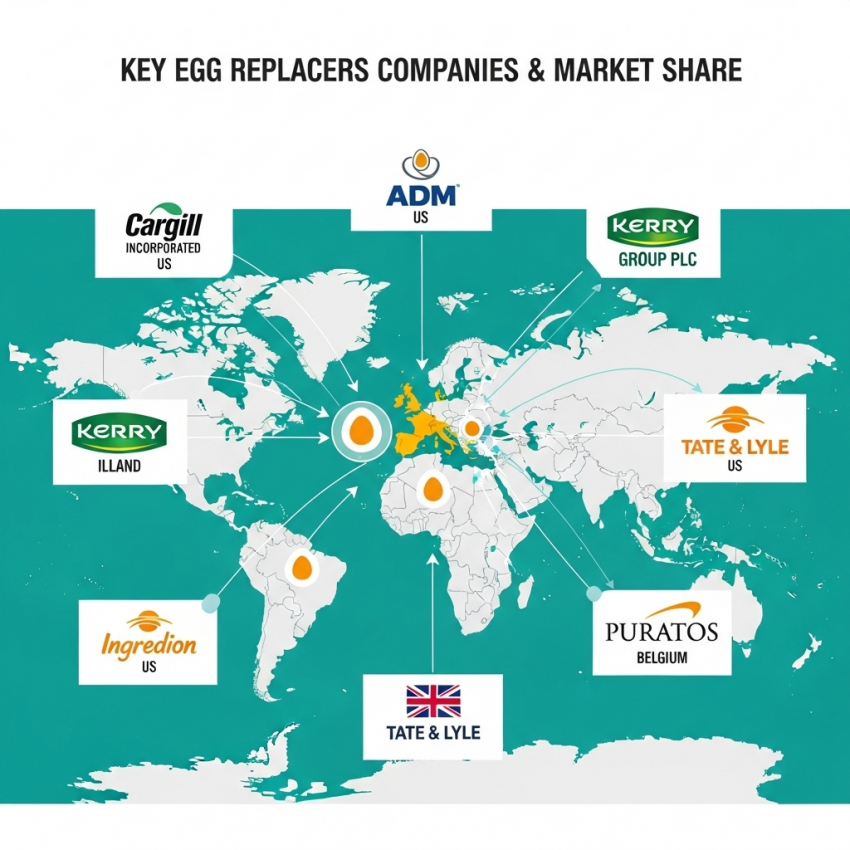The global food industry is in the midst of a quiet yet powerful transformation—and eggs are at the center of it. According to MarketsandMarkets, the global egg replacers market is projected to grow from USD 2.3 billion in 2024 to USD 3.3 billion by 2029, at a strong CAGR of 8.0%. Behind this surge lies a mix of evolving consumer preferences, technological innovation, and rising demand for sustainability.
Why the Boom? The Perfect Recipe for Growth
Health, Ethics, and Lifestyle Convergence
Today’s consumers want more than taste—they want food that aligns with their health goals, ethical beliefs, and environmental values. Traditional eggs, although nutritious, come with cholesterol, potential allergens, and sustainability concerns. Plant-based diets, veganism, and even flexitarian habits are pushing more people to seek cholesterol-free, allergen-free, and cruelty-free alternatives.
Cost Pressures Drive Substitution
Egg prices are known to fluctuate due to disease outbreaks, supply chain disruptions, and climate variability. This cost unpredictability makes egg alternatives increasingly attractive to manufacturers seeking price stability and improved margins. Egg replacers help reduce overhead while meeting the demand for affordable, sustainable food options.
The AI Advantage in Product Development
One of the more futuristic drivers of the market is the application of AI-powered food analytics. With machine learning models trained on consumer preferences, ingredient functionality, and nutritional data, food tech companies are developing egg substitutes that mimic real eggs more accurately than ever before—in terms of texture, binding, emulsifying, and taste.
Schedule a call with our Analysts to discuss your business needs
Europe Leads the Way
Among all regions, Europe holds the largest egg replacers market share.
- Strict regulations on animal welfare and sustainability
- EU’s upcoming phase-out of caged eggs by 2027
- High consumer awareness of health and environmental issues
These pressures have pushed European manufacturers to accelerate innovation in egg-free products, making Europe a global leader in the segment.
Market Breakdown: What’s Driving Demand?
By Form: Dry Egg Replacers Dominate
Dry-form egg replacers are becoming the top choice for both manufacturers and home cooks. Why?
- Long shelf life
- No refrigeration needed
- Easy to store, transport, and use
- Seamless integration into baking and cooking
Their functionality and convenience are giving them a clear edge in the market.
By Source: Plant-Based Is on the Rise
Egg replacers derived from plant sources are projected to grow at the highest CAGR during the forecast period. The shift is driven by:
- Rising vegan and allergen-friendly product demand
- Interest in clean-label foods with recognizable, natural ingredients
- A surge in flexitarian lifestyles
Advancements in plant-based food tech now allow brands to offer egg alternatives that truly work—from pancakes to pastries to mayonnaise.
Request Custom Data to Address your Specific Business Needs
By Ingredient: Starch Stands Strong
While plant proteins steal the spotlight, starch-based egg replacers are holding strong with the second-largest market share. Here’s why:
- Derived from corn, potato, and tapioca
- Offers excellent binding and thickening properties
- Cost-effective and neutral in taste
- Widely accepted as a clean-label ingredient
As clean-label momentum grows, starch remains a dependable, scalable solution in the food processing world.
Who’s Leading the Charge?
Here are some of the key egg replacers companies shaping the landscape:
- Cargill, Incorporated (US)
- ADM (US)
- Kerry Group plc (Ireland)
- Ingredion (US)
- Tate & Lyle (UK)
- Puratos (Belgium)
- Corbion (Netherlands)
- Arla Foods Ingredients Group (Denmark)
- Glanbia plc (Ireland)
- Danone (France)
- Dupont (US)
These companies are investing heavily in R&D, product innovation, and sustainable sourcing, ensuring the egg alternatives of the future are not just functional—but delicious too.
Final Thoughts: A Market Cracking Open
The egg replacers industry is evolving fast, driven by a potent combination of consumer demand, economic logic, regulatory pressure, and technological progress. As the world embraces plant-forward, health-conscious, and sustainable eating habits, egg alternatives are becoming not just a substitute—but a preferred choice.

